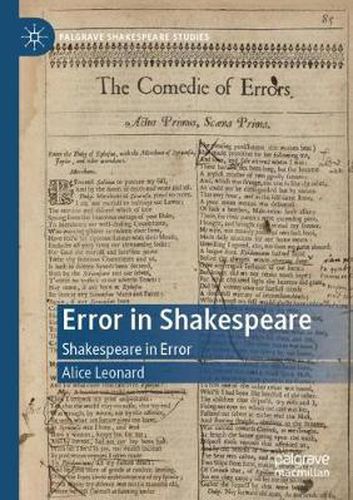Readings Newsletter
Become a Readings Member to make your shopping experience even easier.
Sign in or sign up for free!
You’re not far away from qualifying for FREE standard shipping within Australia
You’ve qualified for FREE standard shipping within Australia
The cart is loading…






This title is printed to order. This book may have been self-published. If so, we cannot guarantee the quality of the content. In the main most books will have gone through the editing process however some may not. We therefore suggest that you be aware of this before ordering this book. If in doubt check either the author or publisher’s details as we are unable to accept any returns unless they are faulty. Please contact us if you have any questions.
The traditional view of Shakespeare’s mastery of the English language is alive and well today. This is an effect of the eighteenth-century canonisation of his works, and subsequently Shakespeare has come to be perceived as the owner of the vernacular. These entrenched attitudes prevent us from seeing the actual substance of the text, and the various types of error that it contains and even constitute it. This book argues that we need to attend to error to interpret Shakespeare’s disputed material text, political-dramatic interventions and famous literariness. The consequences of ignoring error are especially significant in the study of Shakespeare, as he mobilises the rebellious, marginal, and digressive potential of error in the creation of literary drama.
$9.00 standard shipping within Australia
FREE standard shipping within Australia for orders over $100.00
Express & International shipping calculated at checkout
This title is printed to order. This book may have been self-published. If so, we cannot guarantee the quality of the content. In the main most books will have gone through the editing process however some may not. We therefore suggest that you be aware of this before ordering this book. If in doubt check either the author or publisher’s details as we are unable to accept any returns unless they are faulty. Please contact us if you have any questions.
The traditional view of Shakespeare’s mastery of the English language is alive and well today. This is an effect of the eighteenth-century canonisation of his works, and subsequently Shakespeare has come to be perceived as the owner of the vernacular. These entrenched attitudes prevent us from seeing the actual substance of the text, and the various types of error that it contains and even constitute it. This book argues that we need to attend to error to interpret Shakespeare’s disputed material text, political-dramatic interventions and famous literariness. The consequences of ignoring error are especially significant in the study of Shakespeare, as he mobilises the rebellious, marginal, and digressive potential of error in the creation of literary drama.